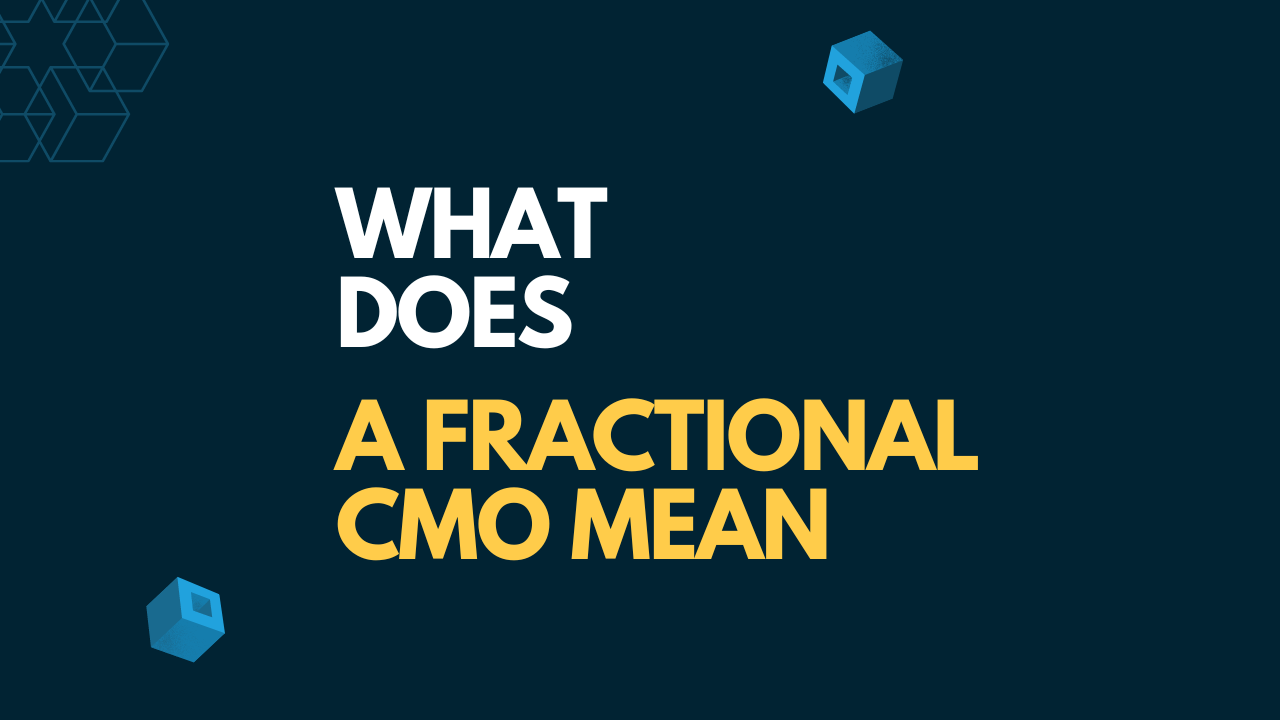Who is this article for? Fractional CMO services can be beneficial for a wide range of companies, including startups, small and medium-sized businesses, and even larger organizations. So, if you belong to any of the mentioned groups, you should find this article What does fractional CMO mean, helpful.
As companies continue to navigate the ever-changing business landscape, they must find ways to adapt and remain competitive. One strategy that has gained popularity in recent years is hiring a fractional CMO or Chief Marketing Officer. However, many business owners and executives may be unfamiliar with what this role entails and how it can benefit their company.
In this article, we will explore what a fractional CMO is, what they do, and how they can help businesses achieve their marketing goals. If you are wondering, What fractional CMO mean, we are going to explain it all in this article. Please use the “Table of content” navigation element to jump to your desired section within this article.
What does fractional CMO mean?
The term “fractional CMO” refers to a Chief Marketing Officer (CMO) who works on a part-time or project basis for a company, rather than in a full-time, permanent capacity. Fractional CMOs are typically hired to provide specialized marketing expertise or to help companies meet specific marketing goals without the cost of a full-time executive.
Responsibilities of this role
The responsibilities of a fractional CMO may vary depending on the specific needs of the company, but generally include developing and implementing marketing strategies, managing marketing teams and budgets, creating marketing materials, conducting market research, analyzing data, and overseeing brand development.
Other responsibilities may include managing advertising campaigns, developing social media and content marketing strategies, and overseeing the company’s website and digital marketing efforts.
The fractional CMO is typically hired to provide specialized marketing expertise on a part-time or project basis, which allows companies to achieve their marketing goals without the cost of a full-time executive. More about this is below –
Difference between a fractional CMO and a full-time CMO
A fractional CMO works with a company on a contract or project basis, typically for a specific period of time or until a particular goal is achieved. In contrast, a full-time CMO is a permanent employee who works for a company on a regular basis.
Fractional CMOs are usually more cost-effective and offer a higher level of flexibility, while full-time CMOs are generally more integrated into the company and have a deeper understanding of its culture, goals, and strategies.
Situations when a company can consider hiring a fractional CMO
A company should consider hiring a fractional CMO when they need high-level marketing expertise and strategy, but don’t need a full-time CMO or can’t afford to hire one.
Some specific situations where a company might consider hiring a fractional CMO include:
- Lack of marketing expertise or experience within the company
- A need for a strategic marketing plan to help the company grow or pivot
- Difficulty in executing marketing initiatives due to resource constraints or lack of bandwidth
- Need for specific expertise, such as digital marketing, branding, or product marketing
- Desire to optimize marketing spending and ROI
Overall, hiring a fractional CMO can provide companies with the marketing expertise and strategy they need to achieve their business goals, without the commitment and cost of a full-time CMO.
cost to hire a frictional CMO
The cost of hiring a fractional CMO (Chief Marketing Officer) can vary depending on a number of factors, such as the level of experience and expertise required, the scope of the project or engagement, and the location of the CMO.
In general, fractional CMOs may charge an hourly rate, a monthly retainer fee, or a project-based fee. Hourly rates can range from $150-$500 per hour, while monthly retainers can range from $2,500-$20,000 per month. Project-based fees can vary widely depending on the scope and complexity of the project.
It’s important to note that while hiring a fractional CMO can be a more cost-effective option than hiring a full-time CMO, the cost can still be significant for some businesses. It’s important to carefully evaluate the potential ROI of hiring a fractional CMO and ensure that the investment aligns with your business goals and budget.
How long does a typical engagement last?
The length of a typical engagement with a fractional CMO can vary depending on the scope and goals of the project or engagement. Engagements can range from a few months to a year or more, depending on the needs of the business.
Some businesses may engage a fractional CMO for a specific project, such as a product launch or marketing campaign, and the engagement may last only a few months. Other businesses may engage a fractional CMO to provide ongoing strategic guidance and support, and the engagement may last a year or more.
It’s important to note that fractional CMOs are typically engaged on a part-time basis, with a set number of hours per week or month. The specific length of the engagement can be determined by mutual agreement between the business and the fractional CMO, based on the scope of the project or ongoing needs of the business.
qualifications and experience
To be a fractional CMO (Chief Marketing Officer), a person typically needs a combination of education, experience, and skills.
Some typical qualifications and experience that a fractional CMO may possess include:
- Bachelor’s or Master’s degree in Marketing, Business Administration, or a related field
- 10+ years of experience in marketing, including experience in leadership roles such as Director of Marketing or VP of Marketing
- Experience working with companies in a variety of industries and sizes, including startups, small businesses, and large enterprises
- Deep understanding of marketing strategy, including branding, customer segmentation, product positioning, and digital marketing
- Proven track record of developing and executing successful marketing plans and campaigns
- Excellent communication and leadership skills, with the ability to collaborate with cross-functional teams and manage external vendors or agencies
- Experience with marketing technology and analytics, including tools for email marketing, social media, SEO, and data analysis
It’s also important for a fractional CMO to have a flexible and adaptable approach, as they may be working with different companies and industries with varying needs and challenges. They should be able to quickly understand a company’s business goals and develop a customized marketing strategy to help achieve those goals.
How does a fractional CMO approach developing a marketing strategy?
A fractional Chief Marketing Officer typically approaches developing a marketing strategy by following a structured process that includes the following steps:
- Understanding the business: The fractional CMO will start by gaining a deep understanding of the business, including its products or services, target customers, and competitive landscape.
- Identifying goals and objectives: The fractional CMO will work with the business to identify its marketing goals and objectives, such as increasing brand awareness, generating leads, or improving customer retention.
- Conducting market research: The fractional CMO will conduct research to better understand the target market, including demographics, preferences, and behavior. This can include both primary research, such as surveys or focus groups, as well as secondary research, such as industry reports or market analysis.
- Developing a positioning and messaging strategy: Based on the research, the fractional CMO will work with the business to develop a clear and compelling positioning strategy and messaging framework that differentiates the business from its competitors and resonates with its target customers.
- Developing a marketing plan: The fractional CMO will develop a comprehensive marketing plan that outlines the specific tactics and channels that will be used to achieve the business’s marketing goals. This may include a mix of traditional and digital marketing tactics, such as advertising, PR, social media, email marketing, and content marketing.
- Setting metrics and tracking progress: The fractional CMO will work with the business to set specific metrics and KPIs that will be used to measure the success of the marketing plan. They will also put in place systems to track progress and make data-driven adjustments to the strategy as needed.
Overall, the approach to developing a marketing strategy will be customized to the specific needs and goals of the business. The fractional CMO will work closely with the business to ensure that the marketing strategy is aligned with the overall business goals and objectives, and will help the business achieve its desired outcomes.
Types of businesses that may need them
They can be a valuable resource for a wide variety of businesses, from startups to established enterprises. Any business that is looking to improve its marketing strategy, increase brand awareness, or generate more leads and sales may benefit from the expertise and guidance of a fractional CMO.
Specifically, businesses that are in a period of growth or transition, businesses that are launching new products or entering new markets, and businesses that do not have the budget or need for a full-time CMO may find that a fractional CMO is a cost-effective and flexible solution to help them achieve their marketing goals.
Challenges faced by fractional chief marketing officer
Fractional CMOs (Chief Marketing Officers) face a variety of challenges that can impact their ability to deliver effective marketing strategies and achieve their goals. Some of the most common challenges include:
- Limited resources: Fractional CMOs may be working with limited resources, such as smaller budgets or a smaller team, which can make it more difficult to execute complex marketing campaigns.
- Short-term focus: As fractional CMOs are typically engaged for a specific project or period of time, they may have a more short-term focus on achieving immediate results, rather than building a longer-term marketing strategy.
- Communication and collaboration: Fractional CMOs may face challenges in communicating and collaborating effectively with the business’s internal team or external vendors or agencies, which can impact the success of the marketing strategy.
- Limited industry knowledge: As fractional CMOs may work with clients across a variety of industries, they may not have the same depth of industry knowledge and understanding as a full-time CMO, which can impact their ability to develop effective marketing strategies.
- Managing expectations: As businesses engage fractional CMOs to help them achieve specific marketing goals, the fractional CMO may face pressure to deliver results quickly and may need to manage expectations about what is realistically achievable in a given timeframe.
- Adapting to different company cultures: As fractional CMOs work with a variety of businesses, they may need to adapt to different company cultures and management styles, which can be challenging.
Simply put, while the challenges faced by fractional CMOs may vary depending on the specific engagement and client, effective communication, a focus on delivering measurable results, and adaptability are key to overcoming these challenges and delivering successful marketing strategies.
on measuring the sucess of this professional engagement
A fractional Chief Marketing Officer typically measures their success by tracking key performance indicators (KPIs) that align with the business’s marketing goals and objectives. These KPIs may vary depending on the specific marketing strategy and tactics being employed, but may include metrics such as website traffic, lead generation, customer acquisition cost, conversion rates, social media engagement, and brand awareness.
In addition to tracking these metrics, a fractional CMO will regularly review and analyze data to make data-driven decisions about future marketing activities. They may also conduct regular check-ins with the business to evaluate progress, identify areas for improvement, and make adjustments to the marketing strategy as needed.
Ultimately, a successful fractional CMO will be able to demonstrate a positive impact on the business’s bottom line, whether that be through increased sales, greater brand awareness, or improved customer retention.
FAQs on What does fractional CMO mean and other related information on this professional role
Yes. Many fractional CMOs work remotely with their clients. Remote work has become increasingly common in recent years due to advancements in technology that enable effective communication and collaboration from a distance.
As long as the CMO has the necessary technology and tools to communicate and collaborate effectively with their clients, they can work remotely. However, it’s important to ensure that they are a good fit for your company’s culture and have experience working remotely before hiring them.
A company can expect them to deliver marketing strategy, planning, and execution.
This can include things like market research, competitor analysis, brand development, messaging, content creation, advertising, digital marketing, lead generation, and sales enablement.
The specific deliverables will depend on the needs of the company and the goals of the engagement. The fractional CMO may also provide guidance and leadership to the internal marketing team or outside agencies to ensure that the marketing objectives are achieved.
There are some potential risks associated with hiring a fractional CMO, such as a lack of alignment with the company’s culture or values, communication issues, or the potential for conflicts of interest if the fractional CMO is working with multiple companies in the same industry.
Additionally, since fractional CMOs are typically engaged on a part-time basis, there may be a risk that they will not be fully committed to the success of the company or may not have the necessary bandwidth to handle all of the marketing needs of the organization. It’s important to thoroughly vet potential fractional CMOs and ensure that they have the necessary expertise, experience, and resources to meet the needs of the company before entering into an engagement.











